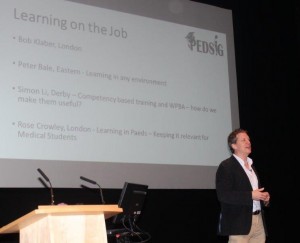Q: What do you get when you take 50+ paediatric trainees/trainers/medical students, 7 fantastic facilitators, 3 challenges and 6 flipcharts? A: Many solutions and a roomful of conversation… (oh, and not much space left on the flipcharts!)
PEdSIG was delighted to welcome a roomful of enthusiastic delegates to the symposium “Learning on the Job: Are service and training mutually exclusive?” The session was opened by Bob Klaber who talked passionately about the importance of “reflection, commitment and permission” to enable learning on the job. Following a “relatively” smooth (and unplanned) room swap the workshop began tackling 3 important challenges faced by trainers/trainees on a daily basis. All participants rotated through each of the three workshops, World Café style, adding iteratively to a summary provided by the facilitator from the previous group. Here are our top solutions/ideas to take back to YOUR workplace, more can be found on our website www.pedsig.co.uk
“Learning in any environment – Challenges, opportunities and solutions”
• Make the learning “bite sized” – don’t attempt to learn everything in one afternoon/clinic/hour. This allows for learning to occur even in the busiest of environments as the expectation is that you don’t need to “learn everything” about a subject all at once
• Signpost the learning. Help the learner to realise when learning is occurring. “We’ve just seen this young person…. What have you just learnt from that encounter? Let’s go and look at the guidelines together”
“Learning in paediatrics – How do we keep it relevant for medical students?”
• Be realistic with prior knowledge of medical students. Encourage “having a go” and give “permission to get it wrong”. We have all been in a situation where you know absolutely nothing about a subject and it is OK to get things wrong sometimes
• Don’t forget the importance of the patient journey. We can all learn a lot from talking to families and children/young people. Encourage medical students to accompany patients for scans etc. widening the number of professionals they can learn from also
“Competency based training and Work Place Based Assessments/Supervised Learning Events(SLEs) – How can we make them useful?”
• Trainer initiated assessments “giving permission”. ASSET allows trainers to send requests to trainees when completing Supervised Learning Events. Make it a 2 way process
• Teaching/learning outpatient clinics – novel ways of completion & “2 for the price of one” (eg. watch the ST6-8 give feedback to ST1-3 on the interaction they have just had and feedback to both)
Feel free to add further tips in the comments below and join in on 4/Nov/15 for the PEdSIG winter meeting and combined launch of the National Paediatric Undergraduate Curriculum at ICH, London.
– @PedSIG
